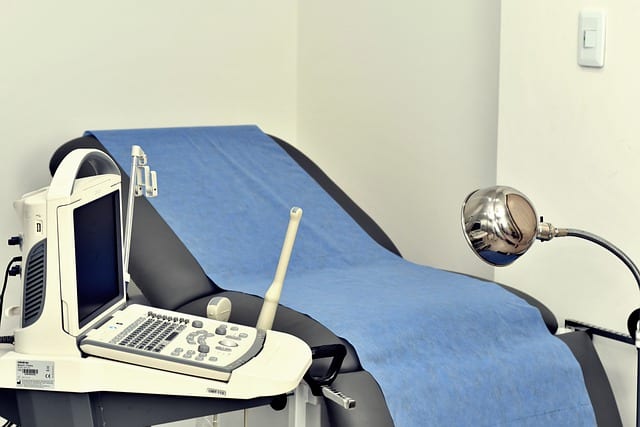
They didn’t tell me it would be THAT kind of ultrasound.
I had been picturing something involving a squirt of blue jelly on my stomach, but this was the other kind, the kind where you have to disrobe. It involves a towel, and a plastic wand about the size and thickness of a cigar. It hurt, not because the ultrasound tech wasn’t trying to be gentle. She was doing a very good job, but such things always hurt me anyway.
“You’re doing so well,” she said a hundred times.
Biting back a groan, I looked up at the television screen on the far side of the room. First the wand photographed my uterus and my cervix, which look like black saucers to me. Then she photographed my right ovary. My right ovary was a black oval with white dots.
“Is that how it’s supposed to look?” I asked.
“Yes,” said the ultrasound tech. “Everything looks normal so far. You’re doing so well! Look, you’re bladder’s filling up again already.”
I explained that I was in ketosis, which the doctor recommended to control my symptoms. I was in the part of the process where you get sick, gulp electrolytes and have to go to the bathroom every so often as the body adjusts to digesting fat instead of glucose. The tech murmured agreement and understanding, and kept affirming that I was doing well.
I wonder how many women she’d told they were doing well, while in just the same position. How many times had she gotten to say “Look, there’s the sac, and that dot is your baby, and let’s see if we can get a heartbeat– there, hear that? It sounds like running horses.”
I wondered if I’d ever get to hear the sound of running horses inside my own abdomen again.
I wondered about the other times, the cases much worse than me. The times there had been a dot inside of a sac, and the dot had not been moving, and there was no sound of running horses. “I’m sorry. I’m so sorry. It’s not your fault, this just happens sometimes. We’ll finish this as quickly as possible so you can get dressed. You’re doing so well.”
My friends and I used to joke, when we bantered about PMS, that God was still upset about Eve and the apple. Of course, back then I didn’t realize I wasn’t having ordinary PMS.
The wand moved inside of me, hurting a new part of my body. The screen showed my left ovary, an opaque black oval with no dots at all.
“Left side is cystic,” said the tech gently.
“I knew it,” I said.
“That’s why you have side pains when you ovulate.”
“I knew it.” I was sitting up then, and the tech was putting the hateful wand away. “I can feel it every time. I shouldn’t be excited, but I’m just so happy to know why this is happening I don’t think it’s really hit yet.”
The tech murmured agreement. “When you finish dressing and wipe off, just throw the towel back on the table or into the hamper. Then check out at the desk. You did so, so well.”
I threw the towel in the hamper. Then I washed my hands at the tech’s handwashing station, even though they weren’t dirty.
The terrible thing about being human is that you can do so well, and everything can still go terribly wrong. The prime example of this is Jesus Christ, who never did a thing wrong in His life. He ended up being tortured to death by state and religious authorities together and descending into the bowels of hell for His trouble. Another fine example is His mother, Most Highly Favored Lady full of Grace, conceived without sin. She had exactly one child in a culture where Divine Favor was measured by the number of children God sent you. The Child didn’t grow up to be a successful carpenter who fathered a gaggle of grandchildren for her to redeem her dignity; He was crucified as a blasphemer and she had to watch. There is also Saint Elizabeth who lived a holy life, childless, appearing disgraced and sinful to her own social sphere, before miraculously conceiving John the Baptist who grew up to be murdered as well. And beautiful oppressed Rachel, who had only two children when her sister had lots. And Hannah the mother of Samuel. And the mother of Samson, who doesn’t seem to have a name.
It’s as if God was trying to say something to people who think being good will bring you good fortune.
I walked out of the doctor’s office, with the tech on my heels reminding me that I had done well. I thanked her for being so gentle. I thanked the receptionist who double checked my appointment time and told me how to call hospital scheduling for a glucose tolerance test.
I wanted to stop into the hospital chapel to have a word with the Lord, but our county is still Code Red for COVID. The hospital doesn’t want people wandering the halls on unnecessary errands. I went outside to wait for the bus.
I am not sinless like my namesake, Mary. I am not even particularly good like Saint Elizabeth, who I’m also named after: Mary Elizabeth Pezzulo, whose feast day is the Visitation. I’m not a Hannah or a nameless mother of Samson, a courageous Queen Esther or a wise prophetess Deborah. I always wanted to be valiant Judith sawing off Holofernes’s head, but I don’t think I’m her either. But God knows I have tried to be good.
I was raised a good Catholic girl. I learned about natural family planning before I was entirely sure how the sperm got into your body in the first place. I tried to keep track of my fertility signs. I tried to do my Catholic homeschooling even when my anxiety made it hard to think straight and monthly bouts of severe cramps made it hard to sit up. I went on diets and exercised to shrink myself to acceptable size as my weight mysteriously mushroomed out of control. I tried to learn to patiently endure my family’s mocking for my ugliness, timidity and laziness. I went to confession when I talked back to my mother. I smeared on acne cream as my face broke out in spots. I plucked hairs. I took ibuprofen and got back to work.
I came to Franciscan University for graduate school, expecting to become a bioethicist. I developed the symptoms of fibromyalgia and chronic fatigue after a nightmare year where I nearly died of an appendix in January and a cecal bascule in June, followed by severe gallstones that led to another surgery. The anxiety went on unabated even though I got prayed over and tried to commit myself to Divine Providence. I conceived Rosie, mysteriously, in a week of the month where my Crieghton NFP chart said I couldn’t possibly be fertile, and then was talked into a home birth by people who were sure doctors might sterilize me or force me onto birth control. The “midwife” turned out to be a locally notorious con artist and nearly killed me; the doctor who delivered Rose by emergency c-section mocked me for trusting her. And then I never had a baby again.
And the weight and the pimples and the hairs kept coming, and my blood sugar went up and doctors chided me for not eating right without asking what I’d been eating. I found herbal remedies that helped a bit with the fatigue, and people chided me not going to the doctor instead. I gave up, and people chided me for that.
I am now thirty-six years old, and finally have a diagnosis. In addition to chronic fatigue and fibromyalgia, I have polycystic ovary syndrome. Polycystic Ovary Syndrome causes anxiety and depression; it causes acne, facial hair, insulin resistance and obesity, and makes it very hard to lose weight. It causes irregular cycles, painful periods and infertility. It can cause the body to ovulate at random times with no warning so an NFP chart won’t catch it, which is how Rosie was conceived.
I am not a perfect or even a very good person. But in some ways, I did very well. The results were not my fault after all.
And there are countless women like me. Countless more who are better people than I am and have suffered far worse. We all did so well, but life is not fair and doesn’t care if you do well.
My next stop was the bus stop, on the grassy berm a safe distance from the hospital doors.
Someone had put a cardboard lawn sign in the ground there, the kind of sign you put up before a presidential election. But there wasn’t a president’s name on it. There was a kitschy painting of the Divine Mercy, Christ looking sympathetic with red and white rays flowing from His heart.
I gazed at Him, and He gazed at me.
Image via Wikimedia Commons.
Mary Pezzulo is the author of Meditations on the Way of the Cross.
Steel Magnificat operates almost entirely on tips. To tip the author, visit our donate page.













